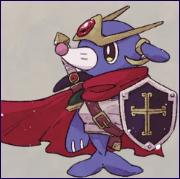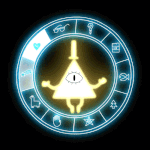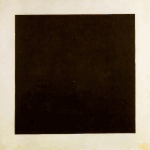|
PJOmega posted:Tells and reads are definitely possible, but shift pretty heavy towards boardgame. Not impossibly mind you. Kai Tave posted:Standard RPG doctrine is also to encourage players to try and safeguard their characters whenever possible whereas in Dark Souls and Monster Hunter you spend quite a bit of time learning by dying, so a game playing off a Souls/MH sort of thing would probably want to take a closer look at the typical assumptions of RPGs re: character mortality and do some adjustments there. This sorta just goes back into the roots of the hobby as being a roguelike where combat was strictly discouraged rather then an action game. Making a system where the GM/Ref/system is out for blood would be extremely hard because you'd need to actually balance it to a knife's edge and discourage GMs from making poo poo up as they go, which is anathema to a grossly large number of people in the hobby. As soon as you say "no, the GM isn't supposed to fix it, nor is he supposed to make things up on the fly, he's supposed to run strictly as written to kill the players and not deviate from that," you're going to lose out. Super difficult video games work because the computer is limited and can't cheat past the limitations. Tell a GM they're job is to kill the players and you end up with actually unwinnable situations - unless you put in restrictions on what a GM is meant to do, at which point, again, you get the screaming masses angry that you're killing the hobby or fuckin' whatever.
|
|
|
|

|
| # ? Apr 23, 2024 15:07 |
ProfessorCirno posted:This sorta just goes back into the roots of the hobby as being a roguelike where combat was strictly discouraged rather then an action game. No, I don't think so.
|
|
|
|
|
ProfessorCirno posted:This sorta just goes back into the roots of the hobby as being a roguelike where combat was strictly discouraged rather then an action game. Strike's adversarial play variants lay out very specific restrictions on the GM's behavior (including what they can and can't do in combat, how they have to let players know precisely what sort of threats are in a specific dungeon beforehand, what sort of items exist and where to find them, etc.) and, unless Jim has been hiding something tragic, doesn't drive people to tears and fury. I get what you're saying but it isn't really a hard and fast rule.
|
|
|
|
It's also worth pointing out that Monster Hunter isn't a "keep dying until you get it right" setup like Souls; even the first time you fight a monster, the fight will be long enough for you to have time to start getting the tells down, and you also can take more damage than in Souls games so it's easier to stay in the fight longer and learn how things work.
|
|
|
|
Yeah, 2 hit KOs don't really happen until you're fighting the 3rd form of the monsters. By then you should be very aware of monster patterns and on the lookout for "what bullshit will this one pull?" GMs "out for blood" is simply supposed to mean that if the players run in and do nothing but AA then the GM should be able to punish them. This means fail states that don't mean "team dies campaign over." Yes, this means restrictions on the GM in combat, and a combination of fairness and lethality is essential. It is a lot of plates to spin, and am well aware how difficult it would be to design. Hence asking if anything has accomplished that feeling. Have been digesting non-combat RPGs (Ryuutama, Fiasco, and Golden Sky Stories as the notables) so was curious about the other extreme options. Thanks for your input everyone!
|
|
|
|
Yeah, it's something I've been looking for as well. Been wanting to run a survival/exploration based campaign where the players have to rely on stuff like using limited resources, setting traps/advantageous situations, knowing when to run, etc. to deal with monsters they can't always just fight straight up.
|
|
|
|
|
I feel like such a game would also have to be diceless or nearly so as well part of the feel of the souls games and such is your play becoming more skillfull and having a 50-5% chance to just fail seems like a way bigger hinderance to me than tells In fact you automatically get tells in a PNP game as the DM litterally tells you what a monster is about to do i think resource management of actions on the player's behalf would produce a better result. hell ok real quick off the top of my head go with a card based system cards are things like dodgeing blocking or special skills/magic any card can be turned in face down for a basic attack you can always back off and draw a card draw two if you leave yourself open open (up to a hand limit based on your stamina) maybe class abilities cause you to discard cards to activate.
|
|
|
|
Elfgames posted:I feel like such a game would also have to be diceless or nearly so as well part of the feel of the souls games and such is your play becoming more skillfull and having a 50-5% chance to just fail seems like a way bigger hinderance to me than tells In fact you automatically get tells in a PNP game as the DM litterally tells you what a monster is about to do i think resource management of actions on the player's behalf would produce a better result. Yeah, every angle I can think up says cards are the 'bounded RNG' solution. Lot of things can be done combining cards and chits to show buildup, cooldown, predicting, tells, and ebb/flow reacting. Dice COULD be used but you'd want to have a lot of ways to affect them (less DnD and more like Anachronism). If a system does combat well, it can have nearly any non-combat system bolted onto it for between encounter roleplaying. But combat itself should be bounded if it isn't going to be a cross between "mother may I" and "I wave my hands and make this poo poo not matter."
|
|
|
|
PJOmega posted:Yeah, every angle I can think up says cards are the 'bounded RNG' solution. Lot of things can be done combining cards and chits to show buildup, cooldown, predicting, tells, and ebb/flow reacting. Dice COULD be used but you'd want to have a lot of ways to affect them (less DnD and more like Anachronism). I know that Malifaux the tabletop wargame uses a card-based combat resolution system as opposed to dice, with the general thrust of the system being a combination of reading your opponent's play and deciding whether to use clutch cards or save them and play something weaker (as well as means to "cheat" though I'm not intimately familiar with how that works in practice). It could be something for you to look at.
|
|
|
|
As long as you aren't doing any explosion tricks, and are going for bell curves, it's easy to keep things within bounds and set up high chances of success.
|
|
|
|
|
I just wanted to let everyone know that today Cubicle 7 released an English translation of the third and final book in the Kuro line, Kuro Tensei. Kuro is an originally French game taking place in a near-future cyberpunk Japan where demons and spirits of darker folk tales are re-emerging. I've often compared it to oWoD's Orpheus, and that's a compliment not to be made lightly; Orpheus and Kuro are both very memorable to me as awesome long-running action-horror campaigns. Be sure to check it out if you're into such stuff, I can't recommend it enough. This book also features "literally Yoshimitsu, the crazy mechanical ninja from Tekken/Soul Calibur" as one of its villains, so there's that.
|
|
|
|
Kuro was a very interesting read. I didn't have enough time with it but I certainly double down on Foglet's recommendation.
|
|
|
|
Effectronica posted:As long as you aren't doing any explosion tricks, and are going for bell curves, it's easy to keep things within bounds and set up high chances of success. Pretty much this.
|
|
|
|
Effectronica posted:As long as you aren't doing any explosion tricks, and are going for bell curves, it's easy to keep things within bounds and set up high chances of success. Yes exactly.
|
|
|
|
ProfessorCirno posted:This sorta just goes back into the roots of the hobby as being a roguelike where combat was strictly discouraged rather then an action game. I touched on this in the Next thread, but in a sense D&D and its ilk has always had this system in place, at least in theory. If you as a DM throw an encounter at a party, you're not supposed to pull whatever monster you want out of your rear end. There's a system. Even the most difficult encounter for a party of level x is supposed to be a monster (group) of level y. And from that level y, you either have a selection of monsters from the Monster Manual, or a set of rules defining how strong level y will come out to be. Now, I will grant that this thing called Challenge Rating is a hell of a lot less useful than I'm trying to present it as if the rest of the game doesn't really follow suit: if the practical difficulty of a monster of any given CR can swing wildly depending on how you build them (i.e. if it's a spellcasting monster vs a melee monster), and/or if the practical power of a player-character in terms of what CR monsters it can reliably beat can also swing wildly (again spellcaster vs warrior, or a core class vs a power-creeping late splatbook class), then the theory is just that, a theory, but I feel that there is an important distinction between: "DMs have been conditioned by years of misinterpretations and jerkass behavior such that an adversarial mode of play is unfeasible because they're never going to honor it" and "Nobody has ever attempted to write rules allowing for truly adversarial play, except for Strike, that one's cool and innovative" because it has been attempted before. It's probably even one of the core concepts of a simulationist approach to game design. It's just that, as in the former, people can end up bringing a lot of baggage to their game or think that they're above needing to read the rules of a game (myself included) and then end up just making things worse through no fault of the rules themselves (because they were never being used in the first place).
|
|
|
|
I'm slowly working on something kinda-sorta similar, although I'm going for a more Witcheresque "think what you're about to get into, plan & prepare accordingly before the combat even begins" vibe. The ways I want to tackle this feel is by: 1) Giving players limited "slots" for items and skills they can bring into combat, as well as having advancement focused more on expanding your scope of options, rather than simply raising numbers (increasing flexibility/combo potential). So you're basically expected to respec appropriately whenever resting, from an ever-growing list of possibilities. 2) Doing away with all the to-hit, damage and assorted lovely fail/pass rolls. You basically roll once per combat round, a pool based on your stats and conditions and then use the die to "buy" actions that just happen. Various actions have different costs - some want high rolls, some want sets-of-a-kind, and if you don't have them, you probably got a straight instead, or maybe have one of emergency actions where using low dice hurts you less. So the roll is much less about being good or bad (the only uniformly bad thing that can happen is rolling ones, which the GM takes away to gently caress with your maths later on) and more about presenting a puzzle each turn, about how to best use the available resources (especially since various dice requirements are designed to cut into each other all the time). 3) Monsters don't even roll the dice, they just do their base damage and poo poo if not blocked. You know what you're up against and it's your choice just how much do you care to not get hurt. UNLESS you roll ones, which the GM can then spend to trigger special attacks and poo poo. So you know how bad the response should generally be, but as the GM calmly waits for you to make your choices first and then punish you for whichever weakness you inevitably chose to leave, the player needs to asks himself just how much he cares about a particular danger to overcommit to it or not. Which, obviously, gets easier when you have a decent idea of what your enemy is capable of. Lichtenstein fucked around with this message at 18:48 on Nov 18, 2015 |
|
|
|
I started the convo in October, should be in that chat thread. In the meantime I'm settling for putting together notes for a pseudo-gothic horror 4e game.
|
|
|
|
Do they discover the terror of a group of hooded cultists chanting "OSR! OSR!" and sacrificing young, nubile 4th edition books to the flames of their God?
|
|
|
|
Helical Nightmares posted:Do they discover the terror of a group of hooded cultists chanting "OSR! OSR!" and sacrificing young, nubile 4th edition books to the flames of their God? I thought the point of a fantasy game was to escape reality.
|
|
|
|
If they burn the books, do the PCs stop existing because the rules to create them don't exist anymore?
|
|
|
|
Worse, they revert to an older edition.
|
|
|
|
Maxwell Lord posted:I started the convo in October, should be in that chat thread. When is Nightfall coming out, btw?
|
|
|
|
Effectronica posted:As long as you aren't doing any explosion tricks, and are going for bell curves, it's easy to keep things within bounds and set up high chances of success. yes but it's a random chance of sucess which goes against the idea of imitateing the skill based play of dark souls and Monster hunter but i suppose you could always narrate your random failures as the enemy blocking.
|
|
|
Maxwell Lord posted:I started the convo in October, should be in that chat thread. Courtesy link.
|
|
|
|
|
Elfgames posted:yes but it's a random chance of success which goes against the idea of imitating the skill based play of dark souls and Monster hunter but i suppose you could always narrate your random failures as the enemy blocking. Well, there is a system out there with a solution to this problem: Torchbearer/Mouse Guard. The conflict system in this game works like this, if we only discuss the relevant details:
With this base, you can just pre-program the monster with a pattern and it would reward player skill. There are two ways to do this: 1: Give them a set pattern. For example, a Goblin will always Attack, then Defend, then Feint, then Maneuver. Then it does this pattern again in the versus order. 2: Have it to respond to the player's actions. For example, a Goblin will start a conflict off by attacking. Afterwards, and for each subsequent turn, a Goblin will Attack if the player Maneuvered, Defend if the player Attacked, Feint if the player Defended, or Maneuver if the player feinted. By doing this, the players can win by learning the pattern. This rewards player skill, gets rid of the random element, and mirrors how enemies in computer games are programmed, if this can be accepted a simplification.
|
|
|
|
Where would these patterns be stored? If the GM has to make them on their own, you still have a situation where the GM is basically on the honor system to stick to the pattern rather than react dynamically to whatever bullshit the PCs pull; if the patters are preset (like say, they come in the game's bestiary section along with monster stats) then the players are on the honor system not to look them up beforehand.
|
|
|
|
I think a certain amount of reliance on the honor system is inevitable in most games.
|
|
|
|
Yeah, "but what if the players decide to study the monster manual" is already a hypothetical concern with many RPGs.
|
|
|
|
Covok posted:Well, there is a system out there with a solution to this problem: Torchbearer/Mouse Guard. Well I don't think this is the worst, but i do think that being so locked in and unable to improvise is going to tank the gm's fun alot. All my system requires is the gm calling out his moves and giving the players plenty of chances and resources to react this lets the GM not be completely bound to some sort of script.
|
|
|
|
Covok posted:Well, there is a system out there with a solution to this problem: Torchbearer/Mouse Guard. Option 3: Give monsters multiple patterns, and the GM chooses one to use each time a new round rolls around. If each monster has 3-5 different attacks the players need to learn, that'll give the GM enough choice to decide which pattern is best right now, while still giving the monsters enough predictability that the players can learn their moves and respond appropriately to any given pattern. Something like this for a very aggressive owlbear, maybe: Claw Rush: Quick Attack, Quick Attack, Quick Attack,Vulnerable. Leaping Attack: Hunker Down, Move to any space and attack everyone adjacent, Rest Heavy Smash: Rest, Roar, Heavy Attack Rending Claws: Quick Attack + Grab, Heavy Attack vs Grabbed target, Roar And the exact values of those attacks and abilities could either be defined in the pattern itself in more depth, or written out in the owlbear's stats and the patterns could be re-used among different monsters.
|
|
|
Elfgames posted:yes but it's a random chance of sucess which goes against the idea of imitateing the skill based play of dark souls and Monster hunter but i suppose you could always narrate your random failures as the enemy blocking. You can't simulate that kind of gameplay exactly on a tabletop, so you can instead incorporate failures of the player's execution into the die roll, such that "player skill" is emulated.
|
|
|
|
|
Kai Tave posted:Yeah, "but what if the players decide to study the monster manual" is already a hypothetical concern with many RPGs. It takes 5 minutes to tinker with monsters in most RPGs and I usually stat mine by frankensteining a lot of stuff from others so I guess it depends on hte GM being a froiking noob m8!!!1
|
|
|
|
I've been DMing tabletop games in some fashion since I was 12, and I don't think I've ever used a prewritten monster exactly as written.
|
|
|
fool_of_sound posted:I've been DMing tabletop games in some fashion since I was 12, and I don't think I've ever used a prewritten monster exactly as written. You started *looks in the direction of the mmo forum and lowers my voice* you started DMing last year??
|
|
|
|
|
Effectronica posted:You started *looks in the direction of the mmo forum and lowers my voice* you started DMing last year?? Please stop doxxing me.
|
|
|
|
TheLovablePlutonis posted:It takes 5 minutes to tinker with monsters in most RPGs and I usually stat mine by frankensteining a lot of stuff from others so I guess it depends on hte GM being a froiking noob m8!!!1 Yeah? That's why it's a hypothetical concern instead of something I imagine a lot of people worry about. I'm just saying that "what if the players read the monster book?" is something that's been possible for decades, I don't see why it would suddenly turn into a bigger deal for some potential Monster Hunter esque game.
|
|
|
|
I think you guys are drastically overplanning with the idea of fixed scripts. Simply have moves that take time to happen, and let time/ticks be a resource for players to manage. Some moves are overt and revealed when they're started, others are subtle and done face down. Think way more BattleCon, less Megaman Boss Fight Patterns.
|
|
|
|
I mean unless your players are literal savants, they're not gonna memorize the entire goddamn monster manual, and reflavoring and refluffing alone would shake them up.
|
|
|
|
Effectronica posted:You can't simulate that kind of gameplay exactly on a tabletop, so you can instead incorporate failures of the player's execution into the die roll, such that "player skill" is emulated. Dice take agency away from the players, i'm not saying it's impossible to have dice work in a game like that but i think that a card based system preserves the gameplay and the feeling of "if i died it was because i made a mistake" better than dice do.
|
|
|
|

|
| # ? Apr 23, 2024 15:07 |
|
Elfgames posted:Dice take agency away from the players, i'm not saying it's impossible to have dice work in a game like that but i think that a card based system preserves the gameplay and the feeling of "if i died it was because i made a mistake" better than dice do. Yeah, I would run with a card or other resource system. Like I said last time it came up though, I think it would work better as a board game than as a true ttrpg.
|
|
|



























